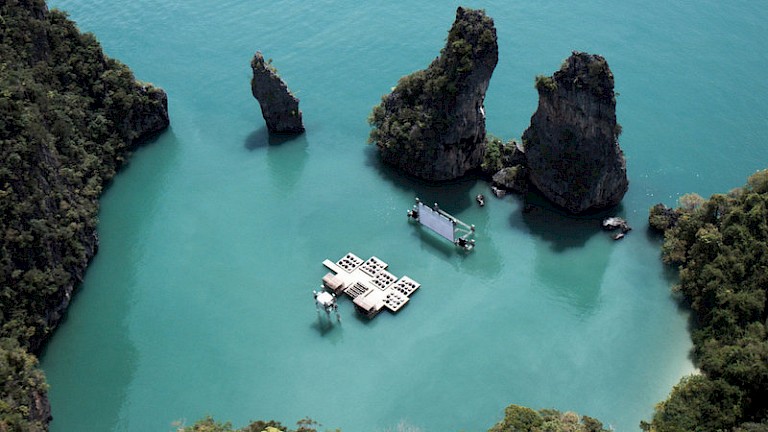



In a sense, Archipelago Cinema opened the tradition of cinema up to the natural environment; the screening times were dictated by tidal rhythms while the cinematic narratives had to work alongside the sound of wind and lapping water.
The festival curators, Tilda Swinton and Apichatpong Weerasethakul, were responsible for the selection of film titles for Archipelago Cinema. Alongside the screenings, they also facilitated activities and conversations as a means of deepening audience engagement with the films and the natural environment. Additionally, Swinton and Weerasethakul instigated the ‘Message in a Bottle’ project, where guests were asked to bring a ‘message in a bottle’ in the form of a film, book, sculpture or painting to share. These messages ended up in a dedicated ‘local library’ presumably for future visitors to the island.
At the conclusion of the festival, Archipelago Cinema was dismantled and gifted to the village where it was built. Scheeren thought of it as “something that belongs to them, that was merely borrowed.”
Like the architect’s other acclaimed project, the Marfa Drive-In (a drive in cinema in the Texas desert),
Archipelago Cinema was an intentionally brief outdoor cinematic experience, its limited life cycle expressing Scheeren’s ongoing interest in the condition of transience. For him, “the short-term occupation of space” is symptomatic of the increase in global mobility and intensification of economic precarity characterizing our contemporary moment. As a proposition, Archipelago Cinema suggests that architects might profitably focus on the design of temporary services and mediated public encounters to capture the attention of increasingly mobile (and transient) communities. A cinema (or theatre or playground) conceived as a modular series of rafts assembled and dissembled as needed is the perfect expression for what Scheeren has described as an “emergent culture of change.”
All copyright belongs to Shanghai Academy of Fine Arts, Shanghai University.

